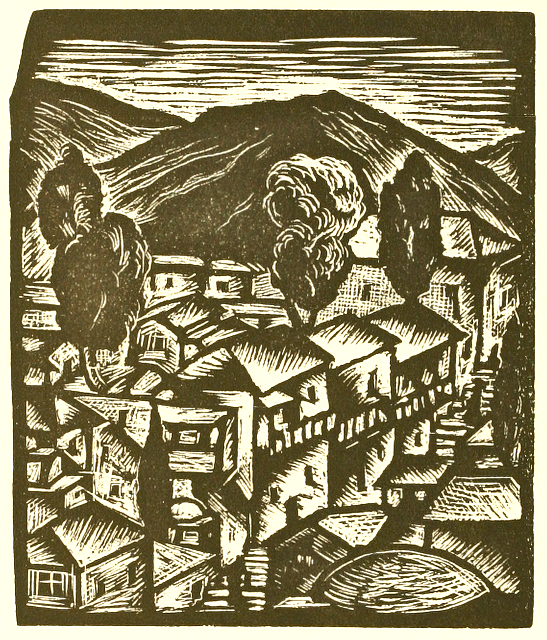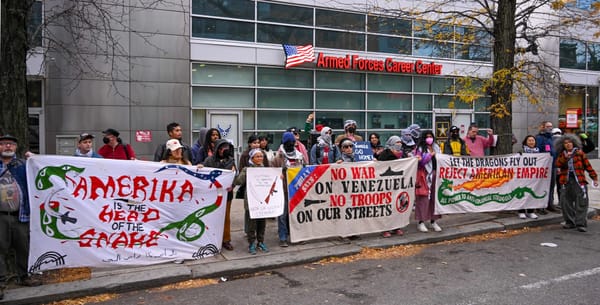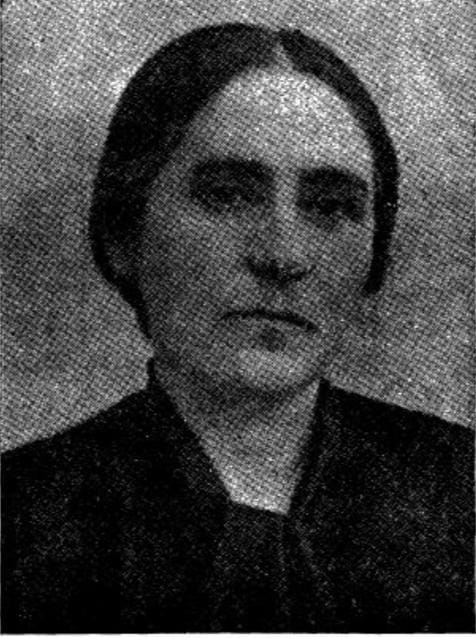We Do Not Belong Here: From the Diaspora to Jalūt

The following essay, drafted by Noah Brehmer under the collective alias Vilna Goles, is an outgrowth of research undertaken in the Exilic Politics Circle. The circle was established over the past year to broadly study histories of exile as a grammar for an emergent political community beyond empire. In the coming month a publication and constellation of reflections exploring exilic politics will be released on dabartis.com with contributions by the Anti-Denialist Coalition, Carsten Juhl, Abdaljawad Omar, and Monika Janulevičiūtė – this text should be seen as an accomplice to them.
This article was co-published with Blind Field Journal.
Please scroll to the bottom of this post to see footnotes that supplement the text.
We could summarize diasporic politics today as setting out to counter modernity's catastrophic trinity of state-nation-territory (as exemplified lately in the Zionist entity) through the now popular jewish (1) slogan: “wherever we are, that is our homeland.” Jewish diasporism, set over thousands of years, is said to unfold in a historical sequence of events of oppression and displacement, that are in turn affirmed as positive grounds for beginning again on the alien lands the jews have entered.
The jewish concept of diaspora has conflicting etymological roots. זעוה (za’avah) was the ancient Hebrew word for diaspora, and it implied “fleeing in terror.” This term came from the following passage in deuteronomy 28:25: “The LORD will cause you to be defeated before your enemies. You shall go out one way against them and flee seven ways before them. And you shall be a horror to all the kingdoms of the earth.” It was in the passage’s Hellenistic translation that the positive emphasis, taken up today, was introduced – διασπορά (diaspora) refers to the dispersion of seeds and regrowth.
As the jewish anti-zionist movement takes steps in affirming its diasporic hereness against the Zionist entity’s thereness, it is absolutely critical that we do so in such a way that doesn’t serve to erase the violence that diaspora as loss and estrangement contains. What follows is my critique of contemporary jewish diasporism for its erasure of this exilic violence in favor of a liberal politics that claims jews can maintain a full civil existence within the capitalist nation-state. Confronting the limits of diasporism’s dualistic logic – either connoting the negative za’avah or the positive diaspora – I build on our call for the jewish anti-zionist movement to identify with the concept of galut or golut (Hebrew and Yiddish, respectively for exile); introducing the deterritorializing potentials embodied in its Arabic enunciation as jalūt.
I
In the final chapter of his 2023 book, The Necessity of Exile, Shaul Magid periodizes the diaspora’s triumph over za’avah and galut to the post-WWII era in the United States when jewish leaders boldly claimed the U.S., in constituting a “true democracy,” resolved the problem of jewish exile by fully integrating them as a minority in civic life. In the so-called free land, Magid notes, the pre-war galut was transformed into the post-war golah (dispersion). The American jewish diaspora, rather than countering Zionism’s negation of exile, established a politics that mirrored and reinforced Zionism’s nation-statist foundations. Against what Amnon Raz-Krakotzkin calls exilic judaism’s “recognition of an unfulfilled present” and “consciousness of a defective world,” post-war jewish diasporists went so far as to claim their home in the new imperialist core could even surpass Eretz Israel as a Divine Providence for the chosen people. As the leader of the Lubavitch movement, Rebbe Menachem Mendel Schneerson proclaimed in 1951:
As the Jewish sun set in one land, it had already begun to rise in another. Now that the great centers of Eastern Europe have been destroyed by Fascism and Communism, America has become the focus and fountainhead of Jewish survival ... American Jewry must recognize this sacred, historical mission which Divine Providence has entrusted to it at this critical moment of our struggle for survival.
Against this naive and ruthlessly opportunistic politics that aligns our full existence with a force that renders so much of the world partial, it is urgent we reclaim our exilic belonging as a practice of trans-national solidarity with the oppressed of the world. (2) We must answer James Baldwin’s question: “Do I really want to be integrated into a burning house?” with a resounding no: I refuse this home, even if the room offered to me may currently appear inhabitable.
II
In his 1998 essay “Between Two Worlds,” Edward Said confronts the diasporic temptation to “cultivate a new garden,” or the “looking for some other association to join” after “having lost my country with no immediate hope of regaining it”[.] Yet having learned from Adorno that “reconciliation under duress is both cowardly and inauthentic,” Said concludes: “better a lost cause than a triumphant one, more satisfying a sense of the provisional and contingent…than the proprietary solidarity of permanent ownership.” Is this compulsion toward a self-effacing fulfilment in place, as the Afro-Palestinian thinker Sophia Azeb so trenchantly retorts, “not the impulse that roots the very routes into diaspora?”
Indeed, we must not forget that the forces of displacement and occupation often cynically promote “diasporism” through, for example, so-called anti-nationalist “pan-Arabism” and “pan-Eurasianism.” Israel has long since attempted to recuperate the anti-colonial pan-Arabist tradition, operationalizing it to promote the narrative that the Palestinians it displaces can simply integrate into the neighbouring Arab world. Russia has similarly employed the concept of Eurasianism to legitimize its territorial claims over Ukraine and other territories on its historical peripheries.
Resisting the blinding positivism of diaspora – as expressed in its Hellenistic etymology – Palestinians understandably favour the Arabic shutāt, which contains both this sense of scattering and the hardships of fragmentation. As Julie Peteet observes of the Palestinian camps in Lebanon, shutāt is employed to express the precarity of dispersion as a condition that exposes the community to the constant threat of further fragmentation. Against diaspora’s risk of merely aestheticizing the cosmopolitan fluidity of capital and invisibilizing the violent expropriations of empire, shutāt directs us to the transcendental homelessness of an existence incessantly fractured by capital.
The age of advanced imperialism, as Said lucidly observed in his foundational 1984 essay “Reflections on Exile,” marks the “age of the refugee.” This age, Said laments, is “spiritually orphaned and alienated, the age of anxiety and estrangement.” In stark contrast with the diaspora that claims a full existence everywhere, refugees find themselves bitterly emplaced across a world that systematically governs their exclusion – neither entering another land to where they can start again nor ever fully exiting the land that erases every trace of their existence where they reside.
In this sense, the age of the refugee is also a negation of exile or its folding within the grips of sovereignty – what Agamben is careful to define as banishment. Agamben’s figure of the Homo sacer, is not the exsul “the one who is taken out” but the banished who is “put at the mercy of” sovereignty. To be banished is to be expelled from within. Agamben carefully contrasts the figure of the ban with Cicero’s ambivalent reflections on exile as both an expulsion from but also a “haven and refuge from penalty” – in other words a status that points to actually exiting and in turn to the possibility of actually entering. In stark contrast: “In the city, the banishment of sacred life is more internal than every interiority and more external than every extraneousness,” Agamben poetically concludes.
It is interesting to note that Said’s essay was published two years after the Palestinian Liberation Organization’s (PLO) political operations in Palestinian camps located in Lebanon were dissolved. In these camps, the PLO maintained advanced mutual aid networks which secured the Palestinian people’s needs while pointing towards a politics of revolutionary struggle. Indeed, the PLO deliberately resisted the term “refugee,” which they saw as a passive and dependent positionality. Fighting against their people’s erasure in the arithmetic abstractions of global governance, Peteet notes that the PLO offered Palestinians the status of “revolutionaries, militants, and strugglers.” It was only after the PLO’s dismantling and recuperation that Palestinians in Lebanon began to call themselves “refugees” in order to gain access to aid. The age of the refugee is an age of global empire wherein resistance is mercilessly eliminated and coopted by a global order that scientifically manages the world’s trajectory toward an ever nearing oblivion.
Left: Burj el Barajneh refugee camp in Lebanon, 1967 via WikimediaCommons. Right: Burj el Barajneh refugee camp in 2011 via Al Jazeera on Flickr. The camp was first established in 1948 after the Nakba and as of 2024 houses 18,000 Palestinians and 40,000 Syrians displaced by the Syrian Civil War.
III
The diaspora, far from negating nation-statism, could rather be seen as a part of its foundations. Drawing from Simon Weil’s late work The Need for Roots, Said comes to the surprising conclusion that “all nationalisms in their early stages develop from a condition of estrangement.” Left with whatever one can scavenge in the barren interiority of banished life, the seduction of national belonging is set in motion. From a broken history and alienated habitat, nationalist populisms offer themselves as incontestable paths to “wholeness.”
Yet this remedy, as Said and Weil will stress, is almost as dangerous as the great malady of uprootedness it sets out to solve. National belonging, as nascita (birth), always requires sacrifice—the negation of the refractory nakedness of “being human” for the birth of man-as-citizen in the national community. The people as the many for the many are sacrificed for the birth of the nation: the people as the many for the one. It is in this sense that the natality of the banished, rather than actually birthing conditions for belonging, only self-propagates displacement. The Romans, as Weil notes, “were a handful of fugitives who banded themselves artificially to form a city, and deprived the Mediterranean peoples of their individual manner of life, their country, traditions, past history to such an extent that posterity has taken them, at their own valuation, for the founders of civilization in these conquered territories. The Hebrews [at least in autocratic and Zionist accounts] were escaped slaves, and they either exterminated or reduced to servitude all the peoples of Palestine.”
As Arendt starkly concludes in “The Decline of the Nation State and the End of the Rights of Man,” the “final solution for the Jewish question” was thought to be resolved by Europe by “means of a colonized and then conquered territory – but this solved neither the problem of the minorities nor the stateless. On the contrary, like virtually all other events of our century, the solution of the Jewish question merely produced a new category of refugees, the Arabs.”
The nation-state, following the lineage of city-states, kingdoms and empires that came before it, paradoxically functions as the essential force of mass expropriation and accumulation today, while simultaneously positing itself as the only true home of the people. In confronting this cruel paradox, Marx affirmed in Capital: “The wealth of the nation is by its very nature, identical with the misery of the people”
What the community of the banished ultimately sacrifice for this wealth, as Weil gravely concludes,“is his most valuable possession in the world of temporal affairs, namely, his continuity in time.” Almost no greater sacrifice of such a continuity could be said to have been made than by the “Jewish” nation claimed by the Israeli state, which turned to the Nazi holocaust itself as a necessary sacrifice of the pathological temporalities of exilic judaism for the redeemed chronos of Israeli nationhood. (3)
Against the sacrificial logic of natalist politics, we can turn to the idea of the people as a multiplicity of bodies that refuse nationalisms immiserating oneness while acknowledging shared histories and traditions of struggle. We could think of it as a nationalism without the certitude of nascita – what Bernard Lazare does so well in enunciating as a politics of the “conscious pariah”:
I AM A JEW and I know nothing about the Jews. Henceforth I am a pariah, and I know not out of what elements to rebuild myself a dignity and a personality. I must learn who I am and why I am hated, and that which I can be.
I shall have the courage to point out the ulcers of my people and to cure them.
I have overcome the pride of being a Jew, I know why I am one, and that binds me to the past of my own people, links me to their present, obliges me to serve them, allows me to cry out for all their rights as men.
Left without a true past to make recourse to in the struggle to regain our dignities and properties, the politics of return is a struggle of knowing thyself “as a product of the historical process to date which has deposited in you an infinity of traces, without leaving an inventory,” as Said writes. Return is finally the practice of giving voice to the forces of life, an abandonment of oneself to the people as an abundance and exuberance of needs and desires. Against the forces of bourgeois nationalism we see in the Palestinian Authority today, which gives voice to the people only to rob them of it, we are asked to turn to a politics of the streets, which as Fawaz Turki captures, is an ungovernable domain of autonomy and multiplicity of resistances: “We grew up in the streets where life fostered the free development of our own Palestinian voice and the fostering of individual identity through the struggle with daily existence...[I]f we were political at all, ours was a politics that embodied the integrity of rootless nihilism.”
IV
While shutāt helps us to recover the negativity that diaspora and golah opportunistically negate, the popular Palestinian notion of ghurba (the estranged or stranger) opens dialogue with judaic traditions of exile. Notably, ghurba shares the same etymological root as the Hebraic galut, both deriving from the Semitic language family. And unlike the Latin equivalent exsul, “the one who is taken out,” wherein emphasis is solely placed on the event of removal, the Semitic forms are dialectical – they communicate a movement between displacement and entrance that bears the tension between these seemingly antithetical states.
As the medieval scholar Michael Pifer noted, this Semitic root came to emphasize the receiving end as an entrance of the “outside in our very midst, attempting to become us.” Al-ghurib (the stranger) invokes a certain demand for the society to welcome the other, alongside a consciousness of the insurmountable negativity of displacement. Pifer in turn opposes what he calls the “age of the gharib” with Said’s “age of the refugee,” which he argues is completely antithetical to the worldly solidarity that gharibness embodies.
It should be taken as no coincidence that Islam was not founded in the holy land of Mecca, but by a community of strangers that formed while in exodus from it, in the city of Medina. Theʾumma, the community of believers, the social fundaments of Islamic theology, is built on the historical foundations of gharibness. For it was only after principled flight from oppression in Mecca that the muhajirun (i.e. the subjects of principled exodus), having aspired to give up all earthly possessions and attachments to thingness, could open themselves to belonging to the community of otherness that the ansar, their hosts, would cultivate with them. The ansar practiced a radical fidelity to this otherness, even offering the ghurba rights to their family inheritances. (4) As Muhammed in turn observed: “Islam began as something strange (gharīb) and will return strange as it began, so glad tidings to the strangers (ghurabā’).”
Surpassing a merely clerical body of the faithful, the ʾUmma, is aptly noted by Daniel Boyarin in The No-State Solution as “the same word that Jewish Arab writers use to describe their people/peoplehood.” Jalūt – a Sephardic Arabic formulation of “galut” is one outcome of this folding. The choice of certain Sephardic jews to neither cling to the orthodox Hebrew form nor dissolve the particularity of their exile by adapting to the Arabic lexicon (using ghurba) is expressive of the ʾUmma’s community of strangers, whose foundation lay in a trans-territorial and linguistic state of in-betweenness. Jalūt points to an upending of genetic theories of identity and language evolution, embracing subjectivity as relational and diffusive; asserting community as simultaneously a domain of convergences and divergences of notions, traditions, values. As the Situationist linguist Alice Becker-Ho observes, “argots,” or non-hierarchical languages, flourish “in any region vulnerable to the influence of foreign languages.” She continues: “For one language to be enriched with words borrowed from a foreign one, there needs to have existed not only contact between people, but also the shared practice of a community.”
Community, rather than policing the borders between the included and excluded, is given a new foundation here as the ceaselessly dialogic folding of strangeness within. We could approach it as a groundless community, what Joseph Albernaz does so well in painting as: “an irreducible commonness or collectivity that is not based on any common measure, transcendent sanction, sovereign principle, or divine guarantee—a community without any master term, without wholeness, origin, telos, identity, or shared essence, only “an originary or ontological ‘sociality.’” As Pifer concludes in turn: “To be gharıb̄–and to recognize the gharıb̄ness of others–is in part to occupy a dialogic position: it is so often a navigation, sometimes a concession, of what is other, foreign, and non-native in one’s midst.”
The Sephardic Moroccan communist Abraham Serfaty offers a window into the folds of a subjectivity that make up this community of the estranged:
When I was ten, I recall my father telling me in the synagogue: “Zionism is against our religion.” I remembered the pilgrimage with my parents, at the age of fourteen, to the tomb of Rabbi Amran Ben Diwan, under the olive tree of Asjen near Ouezzane. What did it matter to no longer believe in God, this past, I could not tear out this olive tree of the land from my being, this age-old olive tree under which so many of my ancestors had prayed. My roots were there, in the depths of the soil. Would I accept that my Moroccan Jewish brothers go to the Holy Land, that land of Palestine where Rabbi Amran came from, to tear out olive trees? Would I accept that they go there to execute half-naked Palestinians? I screamed out against all this.
The olive tree triggers a trans-valuation of values for Serfaty; rebelliously invoking a “we” at a moment when the genocidal engineers of Zionism, in collaboration with the Moroccan bourgeois, were instigating fissures in this vibrant social fabric in order to drive Sephardic jews to Israel where they would be erased, defaced, and exploited. (5)
Finally, it must be stressed that the Ashkenazi concept of doikayt (hereness) resonates deeply with the community of jalūt and the age of the gharib. While captured lately by certain progressive jewish tendencies of the diaspora as a framework for belonging to a democratic multicultural state – for instance, as Melanie Kaye/Kantrowitz affirms in The Colors of Jews: “Doikayt is about wanting to be citizens, to have rights, to not worry about being shipped off at any moment where someone else thinks you do or don’t belong.” – we have argued on Dabartis (the Lithuanian translation of “hereness”) that doikayt should rather be approached as a revolutionary declaration of exilic belonging to the struggle against the territorial, linguistic, and confessional inequalities imposed by states and capital. (6) Like ghurba in the Medieval era, various formulations of hereness – e.g. tutejszość, tuteishaš, etc – were in fact employed from the 18th century in Eastern Europe by a socially marginalized, inconsistent, multiplicity to “build resiliency and rootedness in a world which conspired to give you a sense of belonging only to better turn you into a cannon fodder.”
Doikayt, rather than designating a uniquely Jewish practice of inhabitation, should be seen in dialogue with these regional concepts, as but one folding of belonging in an intensely layered history of stateless, communist, internationalist, antifascist practices of inhabiting the territories of struggle.
The very core of jewish hereness designated an opening of my life, my struggle, my community, onto the universal terrain. From the Bund's central role in the founding of the Russian Social Democratic Labor Party to the decision of jewish revolutionaries to join the international front against fascism in Spain, exilic jews contributed their lives and their knowledge to an anti-imperialist movement we are the inheritors of today.
V
As jews, we are called upon as a pariah people to practice our solidarity by rejecting a political order that includes us only by excluding and oppressing others. Whether it is our “security,” our political rights, or economic status, we must reject a diasporic wellbeing that comes at the cost of the wellbeing of others.
And while the practice of such a solidarity can very well be informed by the histories of galut we commemorate through the holy days of remembrance that make up the jewish religion, we must not stop here. The solidarity we are called upon to practice in these times requires us to put ourselves at risk; to open our own histories of oppression to the historical experiences and traditions of the Palestinian ghurba; to see in the Palestinian’s gharib-ness our own galut-ness.
The community of jalūt embodies this folding; it is a reclaiming of our histories as neither the vocation of one or another “peoples” but as modes of acting, forms of life, on the same side of the barricade – to be against fascism or complicit in its world annihilating paradigm is the choice we are presented with and the struggle that awaits us.
To embrace our jalūt-ness today as a strategy for refusing both nation-statism and diasporism may be a critical step in reclaiming a political experience outside the catastrophic continuum of empire. The community of jalūt overcomes the dualism between the melancholic fixation on loss and the myopic opportunism of entrance. One could call it a being-in-exile: a belonging to the negative, transformatory potentials of a hereness that upends the violent stratifications of the nomoi of the earth; by refusing submission to them as subjects. (7) As the community of jalūt we declare our belonging to place as a belonging to what Sophia Azeb does well in articulating as an “intentional commitment to forging mutual recognition across a historically specific process of enslavement, colonization, displacement, racialization, and perpetual, furious, resistance to it all.”
Let us refuse the oppressive positivism of liberal diasporism and rediscover the vitality within negativity – to affirmatively claim za’avah and declare: we shall remain the horrors of all kingdoms of the earth until all kingdoms fall.
Notes:
(1) I use the lowercase form here to emphasize jewishness as an ethico-political bond over a trans-historical identity.
(2) Such a call follows up and builds upon: Vilna Goles, The Journey of Return: Exilic Solidarity in the Post-Oct. 7th World, Der Spekter, 2025
(3) As the Anti-Denialist Coalition will powerfully reason, given that “the word [holocaust] suggests ‘a supreme sacrifice in the sphere of a complete devotion to sacred and superior motives,’” we must ask, “just who or what has been sacrificed and in devotion to what sacred or superior motive? Here you see a supremacist and genocidal entity that sees and has never stopped seeing opportunity, seizing, instrumentalizing and committing genocide in the name of the victims of genocide.” The extermination camps were in this sense a supreme sacrifice and cleansing of corrupted jewish existence in exile for the purification jewish people in the holy land. The “sacrifice” of the Palestinians today to preserve the pure and sacred body politic of the jewish state is in this sense a continuation of the Nazi technology. See Anti-Denialist Coalition, Accanto: The Unavowable Holocaust, Dabartis, 2025.
(4) For an account of the exodus as an ethics of solidarity with the stranger, see: Zeki Saritoprak, “The Qur’anic Perspective on Immigrants: Prophet Muhammad’s Migration and Its Implications in Our Modern Society” Journal of Scriptural Reasoning 10.1 (2011)
(5) For more on this Sephardic standpoint see Abraham Serfaty, ‘Letter to the Damned of Israel’1982,
(6) See our text, Hereness, jetztzeit, tämänhetkisyys, "this-momentness” in Letter: March 1st, 2024, Dabartis.com
(7) Being-in-exile builds on Agamben’s “being-in-exodus” which he employs as an exit strategy for the Israeli occupation. To be in mutual relations of exodus in relation to the land would amount in interiors and exteriors mutually in determining one another. See “Beyond Human Rights” in Means Without End, p.278.
Noah Brehmer is a researcher and organizer who lives “here” in a city that variously goes by Vilna, Vilne, and Vilnius. From organizing with comrades in the hospitality sector as part of a solidarity network; to participating in the maintenance of various autonomous spaces over the years, Noah’s variegated practice aligns him with the autonomist tradition. Recent authored works include: As if this World no Longer Existed: Three theses on the crisis of political belonging (ed. Neda Genova, Institute for Network Cultures, 2025), A Nomos of the Stateless (Blind Field Journal, 2024); The Living Communism of Friendship (Contradictions Journal, 2023). Brehmer is the editor of Paths to Autonomy (2022, Minor Compositions), and the co-editor of The Commonist Horizon (2023, Common Notions), and the ULWC Reader (2021, Luna6).





